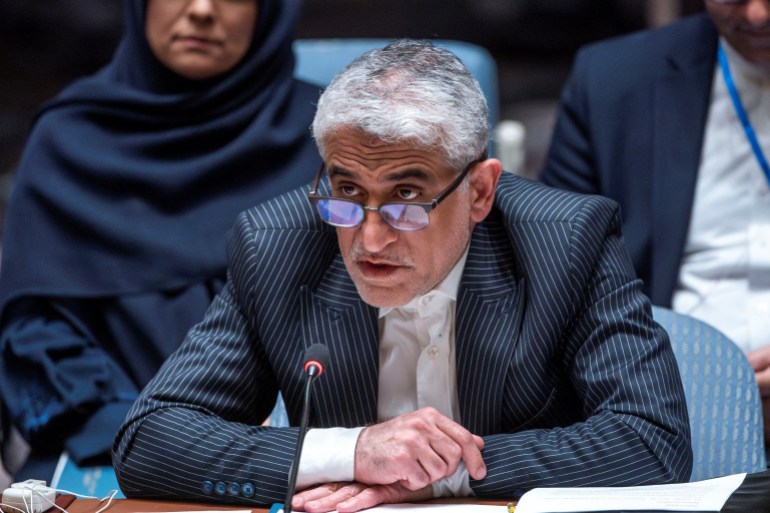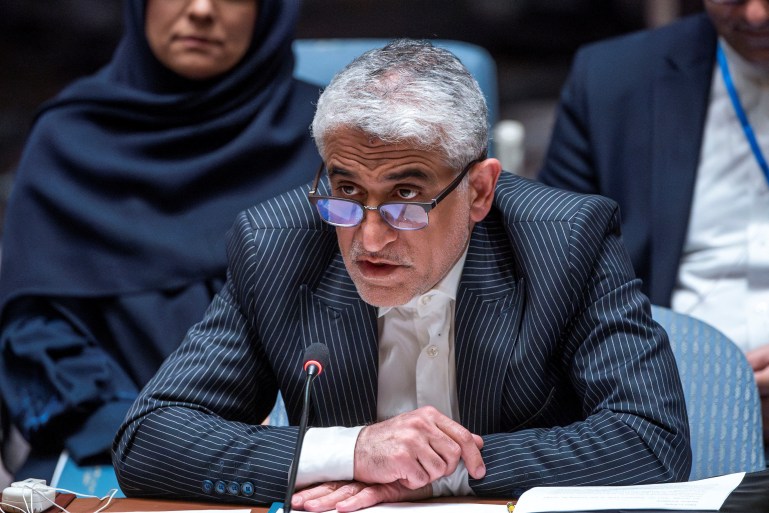The Middle East has been waiting with bated breath for Israel’s response to Iran’s attack last weekend as the spectre of regional conflict seems closer than ever.
That spectre has waxed and waned since the war on Gaza began in October with the fear that it would spiral into a regional war, dragging in Iran and its allies as well as Western countries such as the United States.
In the six months that have followed, there has been violence in the wider Middle East with tit-for-tat attacks between Israel and Iran-backed forces, primarily the Lebanese group Hezbollah.
These attacks have followed a regular pattern with each violent incident marking a slow climb up a rung of the escalation ladder.
Missiles and drones are fired deeper and deeper into Lebanon and Israel, but each side takes a degree of care to increase those distances incrementally and choose targets carefully.
Israel has been more adventurous, often being the side to widen the bounds of the “red lines”, perhaps to make Hezbollah attack in a way that gives Israel a pretext for a more full-throated bombardment of Lebanon.
So far, despite the killing of several Hezbollah senior commanders, the group has held back from using its long-range missiles.
But when Iran saw one of its generals killed in what is widely believed to have been an Israeli attack on Iran’s embassy complex in Damascus, itself an unprecedented military strike on a diplomatic mission, Tehran raised the stakes with a direct attack on Israel.
Iran’s attack has no doubt upped the ante, being the first attack by a foreign state on Israel since 1991. But the Iranians have been careful to emphasise that their attack was “limited”, the majority of the projectiles were drones that took hours to travel from Iran and all were shot down.
Iranian officials have also repeatedly made clear that regional states were warned 72 hours before the attack – not the actions of a state planning to cause any severe material damage.
Risk of war
What comes next? There is a high chance that Israel will respond militarily in some capacity. Prime Minister Benjamin Netanyahu, who has long projected himself as a security hawk and the man to keep Iran in its place, is unlikely to allow a direct attack from Iran go without a response.
Israel, especially right-wingers like Netanyahu, prides itself on the perception that it is the primary military power in the Middle East, and deterrence is vital to maintaining that image, particularly after the damage Hamas did during its October 7 attacks on Israel.

And yet, while the United States and other allies were initially firm in backing Israel in its war on Gaza, they are desperately trying to persuade Netanyahu to not respond to Iran and risk launching a war that many, particularly Washington, would feel obligated to participate in.
“Take the win,” US President Joe Biden reportedly told Netanyahu, eager to avoid what would be yet another damaging US war in the Middle East in an election year when his popularity is already battered by his backing for Israel as its forces have killed nearly 34,000 Palestinians in Gaza.
The Biden administration likely knows that Israel will attack – United Kingdom Foreign Secretary David Cameron has already admitted as much – but it will be putting pressure on Netanyahu to keep its retaliation limited and then cross its fingers that Iran does not respond and everyone goes back to the cold proxy war that Israel and Iran have participated in for years.
It sounds as if everyone – barring, perhaps, some of the more messianic figures in the Israeli government – wants to avoid an all-out war that would be devastating for all involved and the wider region.
But that does not mean that each side doesn’t have its own desired outcomes, all of which could potentially lead to the conflict that they’re all apparently eager to avoid.
Israel wants to re-establish its deterrence and wants to have the last word.
Iran does not want to be seen as weak or fail to respond to escalating Israeli attacks.
The potential for miscalculation
Even if each side wants only that and not a full-fledged conflict, miscalculations happen, and best-laid plans can often go awry.
It may be a cliche to point to World War I, but the way an assassination in Sarajevo sparked a chain of events that dragged countries into war, sometimes against their better judgements, and killed millions of people is a lesson from history that should not be forgotten.
But war is not inevitable, and countries can come back from the brink. A previous cold war that threatened to turn hot is a useful example. The Cuban Missile Crisis of 1962 saw the US and the former Soviet Union get dangerously close to what could have been a disastrous nuclear war.
A resolution was eventually reached, averting the danger, even as the two countries remained foes for decades afterwards.
That could happen today, too. But any resolution to avert the current crisis cannot simply be between Iran and Israel. It has to go to the root of why the region finds itself on the brink of war today: Israel’s devastating war on Gaza.
For as long as the conflict goes on and for as long as Israel continues its killing of civilians, there will always be potential triggers that could drag the whole region into a debilitating war.
Beyond that, the inability of world powers to solve the Israeli-Palestinian conflict, the most intractable of the region’s problems, will continue to be a source of instability. For as long as it remains unresolved and the illegal occupation of Palestinian territory continues, the potential for the region to descend into war will remain, waiting for whatever the latest spark will be.
Read More: World News | Entertainment News | Celeb News
Aljazera










